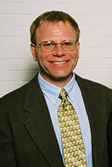Ph.D. Wildlife and Fisheries Science, 1994

Thomas L. Serfass
Thomas L. Serfass is the first recipient of the School of Forest Resources Outstanding Recent Alumni Award, created to honor alumni who have graduated in the previous ten years. He completed his doctoral degree in Wildlife and Fisheries Science in 1994 under the direction of Dr. Robert Brooks, professor of wildlife and wetlands.
After several years in a salaried, post-doctoral position with the Penn State Cooperative Wetlands Center as project manager for the Pennsylvania River Otter and Fisher reintroduction Projects, Serfass secured a tenure-track faculty appointment in the Department of Biology at Frostburg State University. While in that position he has continued to excel in all missions--research, teaching, and outreach. He was recently awarded tenure and promoted to associate professor of wildlife ecology.
Serfass has devoted his professional career to increasing our knowledge about wildlife and to working diligently to protect and restore threatened populations. He began his work with otters while still an undergraduate student at East Stroudsburg University. After completing his master's degree at that same institution, he was accepted into the doctoral program at Penn State. His innovative approaches to carnivore restoration, and his dissertation, "Conservation Genetics and Reintroduction Strategies for River Otters," have led to numerous publications that have redefined how reintroduction projects for wildlife proceed. He has always insisted that the utmost consideration be given to the animal, whether it is an otter, fisher, or elk. This has led to the development of protocols that address not only site selection and project evaluation, but also genetic considerations for the founding members of the reintroduced populations. In addition, his protocols cover extensive animal handling, and care involving veterinarians.
Serfass has also implemented well-conceived education and outreach programs for the public. His attention to detail has led to the safe reintroduction of hundreds of individual animals, while literally offering thousands of citizens of all ages a chance to observe seldom-seen species as they were released. He has written numerous popular articles for lay audiences, and has helped many news reporters to accurately cover releases of otters and fishers back into the wild. He has spent untold hours, driven tens of thousands of miles (often in his own vehicle at his own expense) to deliver more than 200 informative and entertaining presentations to children, sportsmen, professionals, and citizens from all walks of life. These extraordinary and selfless efforts have furthered the public's understanding of wildlife and their habitats.
Serfass's work has led not only to regional acclaim, but also to national and international recognition. He has presented papers in Costa Rica, the Czech Republic, and Chile. He is currently serving as an adviser to the National Park Service on the potential reintroduction of river otters into the Grand Canyon. He is also currently the North American Coordinator of the IUCN (International Union for the Conservation of Nature and Natural Resources) Otter Specialist Group.
Serfass is a member of The Wildlife Society and the American Society of Mammalogists. He has served as president of the Pennsylvania Chapter of The Wildlife Society. He has served on several graduate committees of students in the School of Forest Resources and continues to be actively engaged with several School faculty members. He has been invited as a guest speaker for classes at Penn State and other universities.
In 1993, while still a graduate student, Serfass was recognized as the Pennsylvania Conservation Professional of the Year by the Pennsylvania Wildlife Federation, and in 1997 he received the Three Rivers Environmental Award. Now, as a faculty member at Frostburg State University, he continues to advance the science and conservation of wildlife species, while educating the next generation of wildlife biologists and conservationists.
Department of Ecosystem Science and Management
- Office 814-865-7541
- Fax 814-865-3725
Department of Ecosystem Science and Management
- Office 814-865-7541
- Fax 814-865-3725

